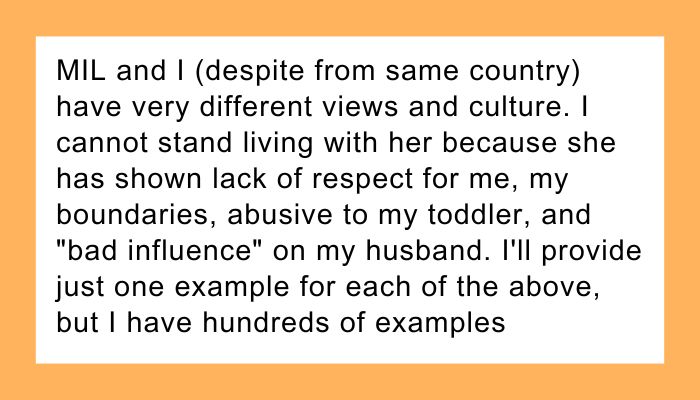Wife Draws The Line When MIL’s “Culture” Starts Threatening Her Peace And Kids’ Safety
It feels good to be surrounded by people who truly love and support you—not just during happy times, but also when life gets hard. Emotional support from family is important during challenges like illness or financial stress.
But here’s the truth: you can’t expect love, care, and loyalty if you treat others with disrespect. That’s where one woman’s story begins—a story about family conflict, mental health, and caregiver stress.
Her husband wanted his mother to move in while she went through cancer treatment. At first, this sounds like the right thing to do—after all, helping loved ones through healthcare emergencies is a noble act. But the wife wasn’t excited about the idea.
Why? Because her mother-in-law had a long track record of bad behavior—toxic family dynamics, cultural disrespect, and even emotional harm toward their young child. This wasn’t just a case of personality clash; it was years of broken boundaries, passive-aggressive actions, and mental strain.
So, what do you do when family caregiving turns into an emotional burden? Keep reading to discover how she made her decision—protecting her mental peace, her child’s well-being, and still showing compassion during a health crisis.
Read for more info Reddit
Taking care of elders is not just a responsibility, it’s a gesture of love and respect
A woman shared how she decided to move out after her rude and manipulative mother-in-law planned to move in for cancer treatment




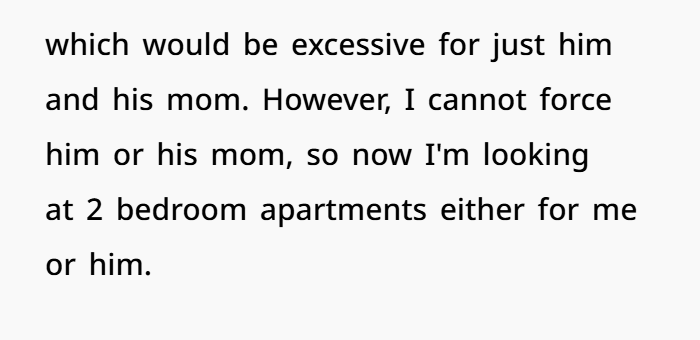
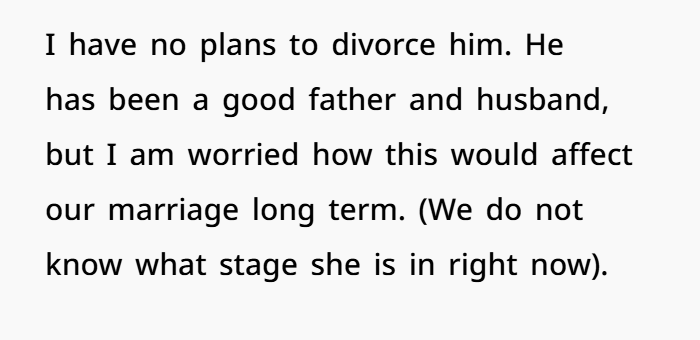

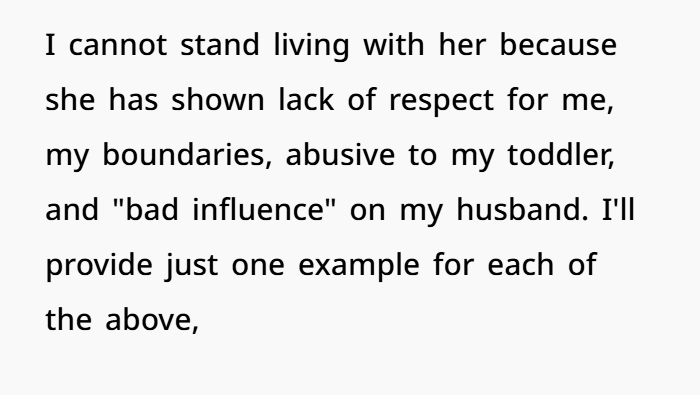
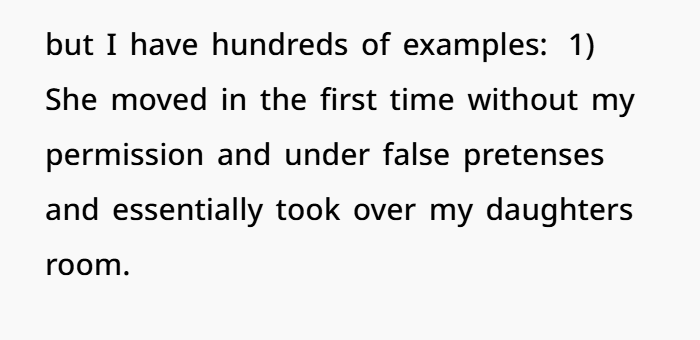

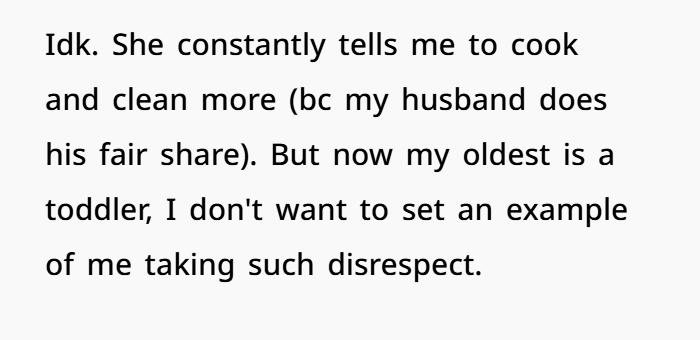
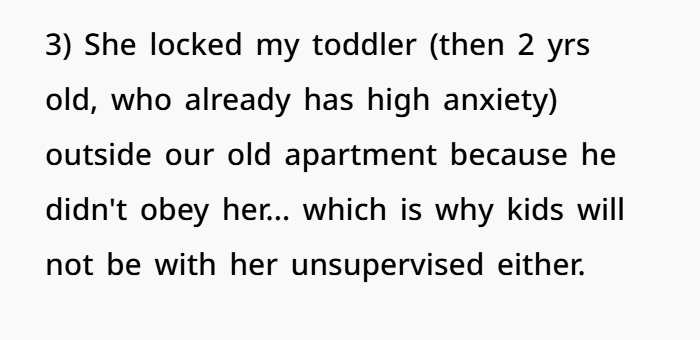
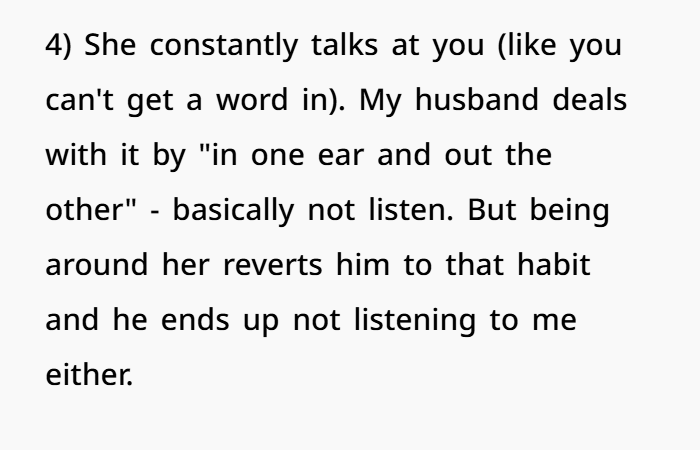

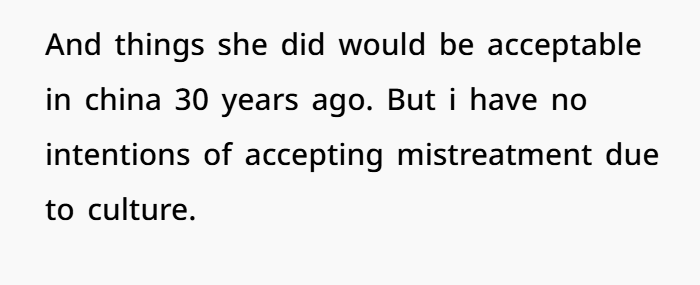
Maintaining a healthy relationship with in-laws plays a big role in overall family harmony
Getting married isn’t just about saying “I do” to your partner—it often means saying “okay, I guess” to their family too. Like it or not, in-laws come as part of the package. When the relationship is good, it can be amazing—think cozy family dinners, shared traditions, and maybe even a free babysitter. But when it’s bad? It can feel like daily stress, emotional burnout, and walking on eggshells.
Dealing with difficult in-laws is one of the biggest hidden challenges in marriage. If your partner’s family doesn’t respect your space or values, it can cause serious problems—not just emotionally but in your overall mental health and relationship satisfaction.
Why Setting Boundaries with In-Laws Is a Must
A healthy relationship with your in-laws needs effort from both sides. That includes respect, open communication, and most importantly—clear boundaries. Maybe your mother-in-law walks into your bedroom without knocking. Or your father-in-law constantly gives parenting advice you didn’t ask for. These issues won’t go away unless you address them early.
Remember: boundaries aren’t walls—they’re healthy fences. They help protect your peace, reduce family tension, and support emotional wellness for everyone involved.
You Can’t Fix Toxic In-Laws, and That’s Okay
One big mistake many people make? Trying to “fix” their in-laws. It rarely works. Adults have deeply rooted habits and personalities. Whether it’s controlling behavior, passive-aggressive comments, or unhealthy family dynamics, changing them isn’t your job.
Instead of trying to correct everything, focus on emotional balance and stress management. If your father-in-law watches the news at full volume or your mother-in-law uses too much oil when cooking—take a deep breath. Learning to coexist peacefully can be more powerful than trying to force change.
Respect Goes Both Ways—No Exceptions
Whether you’re a daughter-in-law or son-in-law, showing basic kindness and mutual respect is non-negotiable. No one wants to be criticized in their own home. Respect isn’t about being overly formal—it’s about knowing boundaries, avoiding judgment, and keeping the peace.
Pick Your Battles: Not Every Issue Is Worth a Fight
Family fights are normal, but not every annoyance needs to be a full-blown argument. Ask yourself—is it really worth getting upset over how the dishwasher is loaded or who left the lights on? Probably not. Save your energy for bigger issues—like someone moving into your home without a conversation (yes, that happens too).
Don’t Take Everything Personally—Protect Your Mental Wellness
Sometimes, your in-law’s comment about your cooking or that “forgotten” invitation to the family group chat might sting. But not everything is meant to hurt you. Letting go of small slights can protect your emotional peace and help avoid unnecessary conflict.
At the end of the day, healthy family relationships take patience, empathy, and a whole lot of deep breaths. With the right mindset, you can protect your marriage, maintain your peace, and even create better connections with your in-laws—without losing yourself in the process.
Disrespect from in-laws should never be tolerated—it’s okay to set boundaries or limit interactions
When things are going well with your in-laws, quality family time can strengthen the bond. Whether it’s a fun movie night, a relaxing picnic, or just Sunday dinner together—these moments help create happy memories. And those shared memories? They make future disagreements easier to handle. Who knows? That grumpy father-in-law might actually be funny once you give him a chance.
Use Empathy to Reduce Family Drama
Empathy is a powerful tool for reducing family tension. Try to understand why your in-laws act the way they do. Maybe your mother-in-law nags because she feels lonely. Or your father-in-law criticizes out of habit, not hate. You don’t have to accept bad behavior, but recognizing the emotional root behind it can help you respond calmly and wisely.
This doesn’t mean you’re ignoring toxic behavior—it means you’re choosing emotional maturity and peace of mind over constant conflict. And more often than not, empathy works better than confrontation.
Healthy Communication = Healthier Relationships
Never assume your in-laws know what bothers you. They aren’t mind readers. If something crosses a line, speak up—respectfully and clearly. The more you communicate, the more chances you have to clear up misunderstandings.
Open, honest conversation builds trust. Silence, on the other hand, leads to resentment. Many family issues come from simple miscommunication. That’s why clear, kind communication is essential for relationship management and long-term peace.
When In-Laws Are Toxic, Protect Your Mental Health
Let’s be real: sometimes, despite your best efforts, the relationship stays toxic. And that’s okay. In those cases, setting boundaries and protecting your mental health becomes the priority.
Limit your time around people who drain you. Reduce unnecessary interaction. This isn’t being rude—it’s emotional self-care. You can love someone and still need space to breathe. Your peace matters.
Just like in this real-life story: a woman decided to move out for her own well-being. It wasn’t an easy choice, but it was the right one for her. She respected herself enough to walk away from what was harming her mental health.
Would you have made the same decision? Or handled things differently? Drop a comment below—we’d love to hear your thoughts and personal experiences. Your voice matters, and someone else might learn from your story too.
The author explained more about her mother-in-law’s condition and clarified that her husband is otherwise a supportive and kind partner






